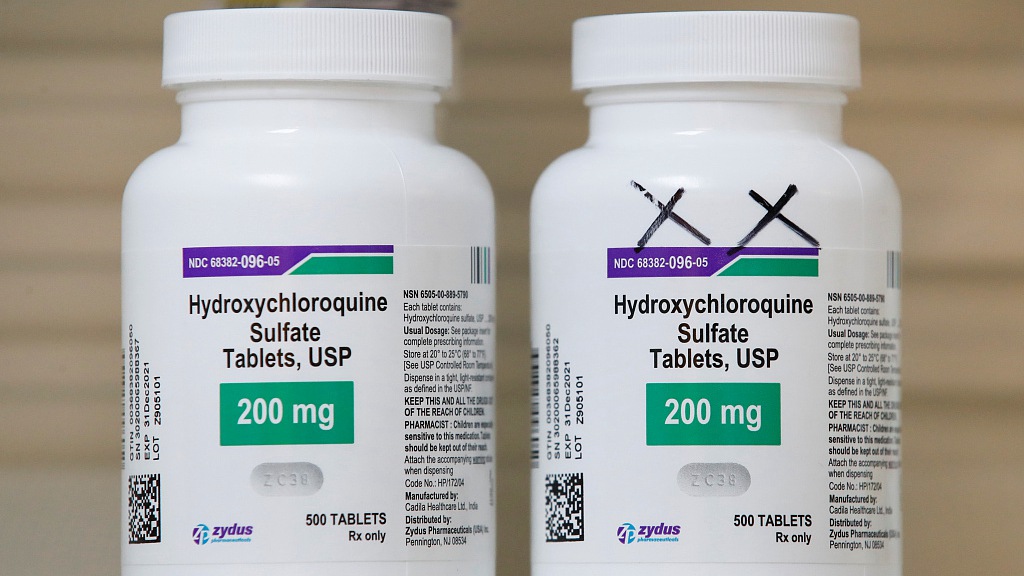
The antimalarial drug hydroxychloroquine. /VCG
The antimalarial drug hydroxychloroquine, which was touted by U.S. President Donald Trump, was found effective in treating COVID-19 patients by a new study after many others said no.
The study, led by a research team from Henry Ford Health System in southeast Michigan, U.S., was published in the International Journal of Infectious Diseases on July 1.
They looked at 2,541 hospitalized COVID-19 patients between March 10 and May 2 and found that those who took hydroxychloroquine had a “significantly” lower mortality rate.
Patients involved were generally over 18 years old, with a median age of 64. Of those who were treated with hydroxychloroquine alone, 13 percent died, compared with 26.4 percent of those not treated with the drug.
The study also evaluated the role of azithromycin in the treatment of in-patients with COVID-19.
“Overall crude mortality rates were 18.1 percent in the entire cohort, 13.5 percent in the hydroxychloroquine alone group, 20.1 percent among those receiving hydroxychloroquine + azithromycin, 22.4 percent among the azithromycin alone group, and 26.4 percent for neither drug,” said the report.
“Our analysis shows that using hydroxychloroquine helped saves lives,” said neurosurgeon Steven Kalkanis, CEO of Henry Ford Medical Group in an article from the Detroit-based health system. “The data here is clear that there was benefit to using the drug as a treatment for sick, hospitalized patients.”
Dr Marcus Zervos, division head of Infectious Disease for Henry Ford Health System, said the finding have been “highly analyzed and peer-reviewed,” and attributed their different findings of the drug from other studies to “early treatment,” “a combination of interventions in supportive care of patients,” and different dosing.
“Considered in the context of current studies on the use of hydroxychloroquine for COVID-19, our results suggest that the drug may have an important role to play in reducing COVID-19 mortality,” Zervos said.
In spite of the positive findings, Zervos cautioned that the study results should not be applied to patients treated outside of hospital settings, and further confirmation in prospective, randomized controlled trials is required.
Controversial findings
The findings are disputed.
The World Health Organization (WHO) just ended the trials of hydroxychloroquine and lopinavir/ritonavir treatments on July 4, as the drugs “produce little or no reduction in the mortality of hospitalized COVID-19 patients when compared to standard of care.”
Before the WHO’s statement, the National Institutes of Health announced to stop the clinical trial of the drug on June 20, saying “while there was no harm, the study drug was very unlikely to be beneficial to hospitalized patients with COVID-19.”
The U.S. Food and Drug Administration revoked the emergency use authorization (EUA) for the drug on June 15, as it is “unlikely to be effective in treating COVID-19 for the authorized uses in the EUA.”
Researchers from the Oxford University halted the “RECOVERY” trial on the drug on June 5, concluding that it has no beneficial effect in patients hospitalized with COVID-19.
Other researchers also pointed out the limitations of the study.
Dr Todd Lee from the Royal Victoria Hospital in Montreal, Canada, said the results were relevant with the use of steroid.
The widely available steroid dexamethasone was found effective to reduce the risk of death among severe COVID-19 cases in a study led by the University of Oxford, and the patients treating with hydroxychloroquine used concomitant steroid twice more than those non-treated, he told CNN.
The Henry Ford team also compared their study with a New York one where no reduction in hospitalized patient mortality was observed with hydroxychloroquine treatment.
“This study included patients who were initiated on hydroxychloroquine therapy at any time during their hospitalization,” said the team in their report, but theirs in contrast, treated 82 percent of the patients with the drug within the first 24 hours of admission, and 91 percent within 48 hours of admission.
Eli Rosenberg, lead author of the New York study, told CNN that their patients started taking the drug on average one day after being hospitalized. “Maybe there’s a little bit of a difference, but it’s not like patients in New York were being started on day seven. That’s not what happened.”
He also pointed out that the Henry Ford research excluded 267 patients who had not been discharged from the hospital, which might make the drug “look better than it really was.”
Kalkanis said that their findings don’t make previous studies “wrong or definitely a conflict.”
“What it simply means is that by looking at the nuanced data of which patients actually benefited and when, we might be able to further unlock the code of how this disease works,” he said as cited by CNN.


